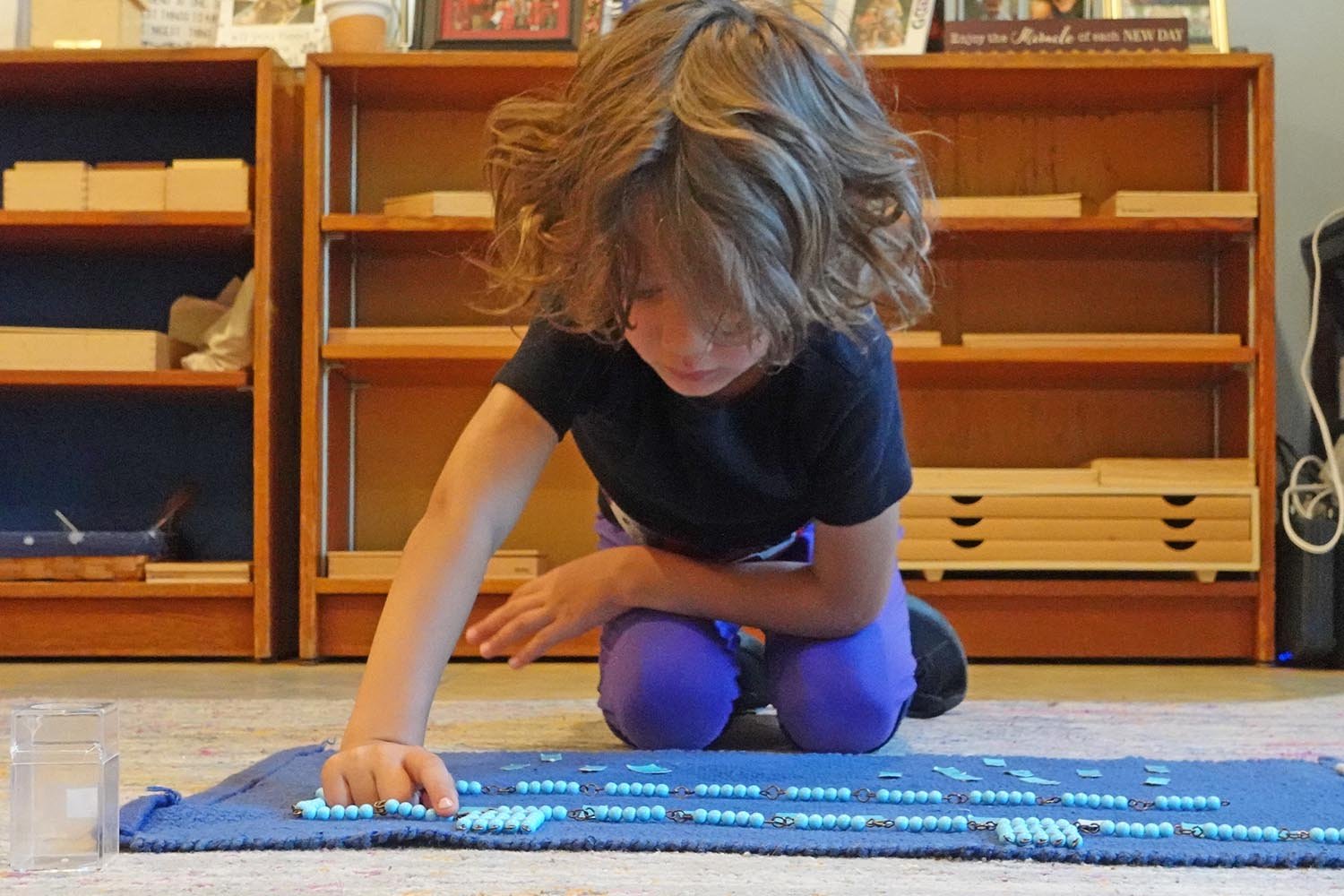The Classroom
The Montessori primary classroom is an environment prepared by an experienced guide and is aimed at developing the totality of each child. It possesses an atmosphere of calm, order and joy, where children ages 3 through 6 learn together.
The younger children are guided by the classroom guide and by observing and working with the older students. The older children learn leadership and compassion in this mixed-aged setting. Primary students literally absorb information, experiences and life around them.
Children learn to work at a task from beginning to end, develop self-discipline and the capacity for deep concentration. Respect for others and good manners develop naturally as the children grow within the Montessori environment.
Scroll down to discover more about our primary classroom.
Other Programs
Our school offers a number of supplemental program opportunities in addition to the Montessori core curriculum.
- MUSIC: Students are exposed to various musical genres: classical, folk, spiritual, jazz and more.
- DANCE: Dance instruction is provided by the Carolina Dance Collaborative. Students are introduced to ballet, jazz, modern, hip-hop and African dance. Performances are held during winter and spring concerts.
- YOGA: Colin Blassengale, our lead guide, and her assistant, Kessie Blassengale, are both yoga instructors. We greet each day with a sun salutation followed by yoga exercises which promote strength building, balance, concentration and focus.
- SPANISH: The Spanish language is introduced through songs, games and repetition. Students learn vocabulary, simple greetings, directions and gain a cultural awareness of Spanish-speaking countries. Our Spanish-speaking parents also take an active roll in reading and speaking to our students.
- OTHER OPPORTUNITIES: Students experience enrichment fieldtrips, art, swimming, museums, parks and theater performances.




Practical Life
Chores found menial and burdensome by adults are fascinating to children, who find these life skills meaningful. Practical life experiences such as polishing silver, washing windows or arranging flowers help children acquire a strong sense of independence and responsibility. The completion of each practical life lesson follows an order of presentation which has been established by the Montessori Method to develop concentration, discipline and order — characteristics which promote academic and life successes.
Sensorial
The senses are more adept to refinement for children of 3 to 6 years of age and if not refined early in life, must be further developed in later years. Work with sensorial materials help children fine-tune and develop their senses by classifying and sorting objects by size, shape, color, touch, sound and weight. These experiences have proven effective in laying a strong foundation in all academic subject areas. Sensorial development facilitates a child’s ability to learn at higher levels of intellectual instruction.
Math
Mathematical sense, at the primary level, is built on the foundation of the sensorial materials where many of the fundamental concepts of length, volume, gradation, sequencing and grouping have been experienced. Students work with concrete materials which facilitates a stronger understanding of the abstract concepts of mathematics. Students experience the physical attributes of the decimal system as well as squared and cubed numbers. As a result, you will see many Montessori students working one to two grade levels above their public-school peers.
Language
Literacy is a complex process which involves the synthesis of symbols, sounds, words, ideas and the physical skill of writing. Rather than learning the names of letters, students learn phonemic awareness taught through hands-on activities. In the Montessori classroom, handwriting is learned prior to reading and is practiced by tracing shapes, sandpaper letters and the moveable alphabet. Reading is acquired when students use the physical movement of writing to do, create and build, thus helping them make meaning with letters they have learned to form.
Wheatley Montessori School encourages its students to feel comfortable communicating individually and in small groups. Students are also encouraged to speak publicly through poetry and prose at annual school events and performances.
Science
Primary students carefully prepare and practice the basic skills of science by measuring, comparing, classifying, and observing. Through their studies in botany and zoology, our students learn the scientific nomenclature of plants and animals and are also introduced to the basic concepts of physical science. Weekly science experiments are conducted to give students a greater understanding, interest, and appreciation of their environment.
History, Geography
and Culture
We want our students to live in a society which values diversity, inclusion and respect for all peoples and cultures. Our students learn about the world and their place in it by studying the solar system, local communities, continents, countries, and major cities of the world.
History is presented in its truth to educate students on the experiences and contributions of all world inhabitants. History comes alive as our guides, staff and students represent and model historical figures of our past. Wheatley Montessori School celebrates Indigenous Peoples Day, Spanish Heritage Month, Black History Month, Asian Pacific Heritage Month and Women’s History Month.









